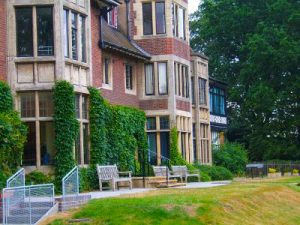 Every summer socialists descend on Birmingham for a themed summer school weekend featuring talks, discussions, a bookstall, refreshments, room and full board, and of course evening socials.
Every summer socialists descend on Birmingham for a themed summer school weekend featuring talks, discussions, a bookstall, refreshments, room and full board, and of course evening socials.
If you haven’t been, you don’t know what you’re missing. Those who’ve been once tend to come back again and again.
2020 of course had to be online-only due to the pandemic, but we were back in Birmingham the next year with 2021 being our first ever hybrid event and a great success.
Look out for details of the next Summer School and book your ticket early, because 2023 sold out very quickly!
Meanwhile, below are recordings of some of the talks and discussions from previous years.
SUMMER SCHOOL 2022
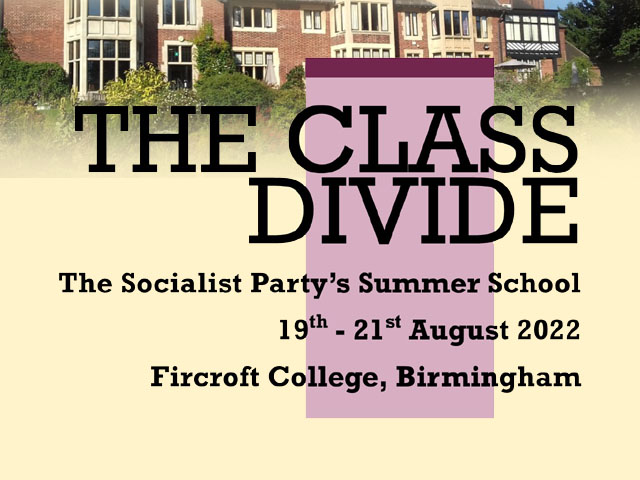
The richest 10% of people own more than 80% of global wealth, and the 10 richest men have six times more wealth than that of the poorest 3.1 billion people combined.
These vast inequalities in wealth reflect how society is split into two classes: the capitalist class who get their wealth through owning industries and corporations, and the working class who rely on wages or benefits to buy what is needed.
The weekend of talks and discussion looked at why capitalism is divided into classes and how the antagonism between them impacts on the way we live. What is ‘class consciousness’ and how does it develop? To what extent is it meaningful to say that there is a middle class? What classes were there before capitalism, in previous stages of history? And what could a future classless society be like?
The Class Divide and The Role of Trade Unions (37 mins)
Howard Moss
Historically trade unions were voluntary organisations set up by the working class to enable them to get as good a deal as possible in selling their skills and energies to employers, while at the same time not having the aim or ability to transcend the class divide they were (and are) a player in. But what about circumstances in which workers decide it is not in their interest to be part of trade unions, as many do these days? Do they lose by this? And what about ‘political’ trade unionism where unions manage to get themselves involved not just in trying to protect or improve the pay and working conditions of their members but instead are used as vehicles for campaigning for various reforms of capitalism or even for Trotskyist-style revolution? What should the Socialist attitude be towards such activities by trade unions?
Class Consciousness and the Socialist Revolution
Mark Znidericz
Friedrich Engels summarised the life’s work of Karl Marx as a mission ‘to contribute, in one way or another, to the overthrow of capitalist society and of the state institutions which it had brought into being, to contribute to the liberation of the modern proletariat, which he was the first to make conscious of its own position and its needs, conscious of the conditions of its emancipation.’
This talk will start by exploring the concept of working-class consciousness as used by the pioneers of modern socialism in the 19th and early 20th centuries. What did they mean by class consciousness and what importance did it have in their vision of the socialist revolution? How does class consciousness arise and what is the role of the working-class party in its development? Does the absence today of widespread class consciousness despite the presence of the material conditions necessary for socialism call into question the validity of the Marxist analysis of society? It is hoped that the talk will stimulate discussion around questions such as the following:
- Is there a difference between socialist understanding and class consciousness?
- How is capitalist ideological hegemony over society maintained?
- Can working-class consciousness develop on a mass scale while the material base of capitalist society remains intact?
- What significance do our answers to these questions have for the theory and practice of the Socialist Party?
Due to technical difficulties this talk was not recorded.
Let Them Do Yoga! Inequality, Mental Health & Social Revolution (50 mins)
Brian Gardner
This talk will explore one of the less obvious ways in which capitalism and the class divide impacts negatively on humans. As the profit system turns the screw we are faced with huge and growing mental health challenges such as depression and anxiety.
How much of our this is down to the individual’s biology, and how much is social/political? What does inequality do to our psyches? Why are humans so apparently sensitive to class divisions? And does this provide insight to why inequality is so apparently resistant to political reform?
How will the global collective trauma of COVID play out? And what about the looming existential crisis that is the climate emergency?
Once taboo, we are now encouraged to parade our mental health like some fashion accessory. Are there other ways to regain wellbeing than lunchtime meditation or a friendly chat with HR? Are we just accommodating to the pressures of being both worker and consumer under capitalism?
Or are we seeing signs of humanity growing up? Is our mental environment a key battleground? How might mental well-being influence class consciousness? And what could we reasonably say about mental health inside a future socialist society?
How Middle Class Are You? (27 mins)
Mike Foster
Regardless of the economic reality of the class divide, there’s a widespread assumption that a middle class has characteristics and interests of its own. What is this belief based on, and how does it persist? If we go looking for the middle class, we’re likely to learn that reaching this status hinges on having a particular type of job or getting paid a certain amount of wages, or even whether we’d rather go to a musical or to a gig. This talk will examine different attempts to classify the middle class, and to what extent it can be defined into existing.
SUMMER SCHOOL 2021
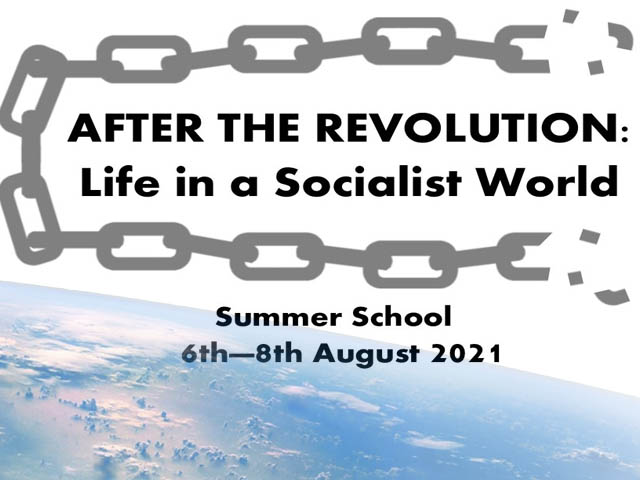
Socialist Recipes
Richard Field
Humanity makes its own history, and socialists in the process of building a post-capitalist society will make choices based on what they believe to be possible and desirable. The success of the socialist project will rest in some measure on the choices made. So what arguments can we make now to ensure a positive outcome?
Socialist Recipes pt.1 (45 mins)
Socialist Recipes pt.2 (58 mins)
New News From Nowhere
Glenn Morris
In 1890 William Morris wrote the utopian novel News from Nowhere in which one William Guest fell asleep and awoke in a socialist society. Glenn will focus on a few areas of what life in a socialist society might look like today over 100 years since Morris’ novel.
New News From Nowhere pt.1 (47 mins)
New News From Nowhere pt.2 (52 mins)
Do Utopias And Works Of Sci-Fi Offer Appealing Visions Of A Socialist World?
Leon Rozanov
Are there any works of fiction that offer a vision of an appealing and realistic future socialist society where one really wants to start living right away?
Sci-Fi Utopias and Socialism pt.1 (34 mins)
Sci-Fi Utopias and Socialism pt.2 (56 mins)
Socialist Decision Making And The Rule Of Three
Paddy Shannon
In the past the World Socialist Movement has favoured delegate democracy as the decision-making model most likely to be adopted in a future socialist society. But that was before modern online communications made direct democracy a real possibility. Though attractive in theory, it sounds like chaos in practice. Who would get to vote on what, and on whose say-so? But actually the entire thing might be managed by the application of just three rules, backed by the same ethical principle that applies across every other sphere of socialist life: from each according to ability, to each according to need.
Democracy and the Rule of Three pt.1 (52 mins)
Democracy and the Rule of Three pt.2 (67 mins)
SUMMER SCHOOL 2020
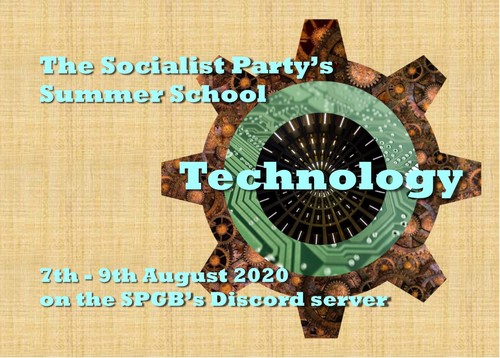
TECHNOLOGY
The Socialist Party’s 2020 Summer School looks at technological progress and its application in the past, present and future. This weekend of talks and discussion is an exciting opportunity to share and explore revolutionary ideas with others, through the SPGB’s Discord server.
From the development of the first tools and the wheel through to the invention of the printing press, the steam engine, the microprocessor and beyond, technology has always shaped how we live. Scientific developments take place in the context of the social and economic conditions of the time. In capitalism, technological progress and how technology is used are driven by what is profitable and cost effective more than by what is really needed and wanted. This means that technology is often used in ways which go against our best interests, whether through environmental damage, the development of ever-more destructive weapons or the misuse of data gathered online and through social media. In a future socialist society based on common ownership and democratic organisation of industries and services, technology could really be used to benefit us, in harmony with the environment. Report on the weekend here.
1) ‘Is Marxism Technological Determinism?’ (21 mins)
“In acquiring new productive forces men change their mode of production; and in changing their mode of production, in changing the way of earning their living, they change all their social relations. The hand-mill gives you society with the feudal lord; the steam-mill, society with the industrial capitalist” (Marx, The Poverty of Philosophy, 1847).
“It is the development of tools, of these technical aids which men direct, which is the main cause, the propelling force of all social development. It is self-understood that the people are ever trying to improve these tools so that their labour be easier and more productive, and the practice they acquire in using these tools, leads their thoughts upon further improvements. Owing to this development, a slow or quick progress of technique takes place, which at the same time changes the social forms of labour. This leads to new class relations, new social institutions and new classes” (Anton Pannekoek, Marxism and Darwinism, 1912).
To what extent, if at all, is this a theory of technological determinism? How do changes in technology lead to a change of society?
Speaker: Adam Buick
Friday 7th August 2020
Pt 2 (49 mins)
2) ‘How the World Socialist Movement Can Use Technology Better’ (35 mins)
A discussion on ideas about how the Socialist Party can make better use of technology. How can our online and social media presence be improved? Can technology help us be (even) more democratic? What are our views on Discord?
Host: Paddy Shannon
Saturday 8th August 2020
Pt 2 (34 mins)
3) ‘Ideology as Technology’ (26 mins)
This talk looks at how the way we think is a form of technology. Starting with mundane objects, like a bicycle, it looks at how the ideas behind inventions are not the outcomes of lone geniuses and inspiration, but are connected to social relations and practices. It discounts the idea that history is driven by simple technological changes, and looks back to the age of conquest to show it was how technology was applied, rather than the possession of technology itself, that was behind the establishment of the European empires. It concludes by looking at the implications for socialism and how a future society might use technology.
Speaker: Bill Martin
Saturday 8th August 2020
Pt 2 (49 mins)
4) ‘How We Feel About Technology – the Views of Günther Anders and Beyond’ (25 mins)
‘Philosophical anthropologist’ Günther Anders’ theories about our attitudes towards technology were formed in the middle of the last century, when television and the nuclear bomb represented the latest in human achievements. He argued that technology makes us feel ashamed, not because of the impact of the mass media or the threat of nuclear war, but because we have become inferior to the technology we have created. Since Anders’ time, technological progress has given us smartphones, artificial intelligence and the world wide web, feats which he would argue further humanity’s obsolescence. This talk gives a Marxist perspective on Anders’ theories and their implications in today’s hi-tech world.
Speaker: Mike Foster
Saturday 8th August 2020
Pt 2 (54 mins)
5) ‘Digital Technologies as a Core of Social Organisation of the Future’ (25 mins)
Direct democracy may have worked well in ancient Greek city-states with thousands of decision-makers. Now with most modern states having millions of citizens, the most widespread form of democracy is representative, and it is easily hijacked by the interests of capital owners or political figures who serve them. Even if socialist ideas were to become more widespread, it remains a question, how exactly would democratic principles that we all consider indispensable be put to work for a socialist society to function efficiently?
One of the earliest markers of human societies differentiating themselves from other animals was language, and later its written form, text. We have learned to pass knowledge on to future generations, and the earliest texts are almost exclusively collections of rules and laws that helped organise societies according to their commonly shared values and beliefs. If we want to create a successful future society based on socialist principles, we need to cement these principles in the text of modern technologies – software code – that will have principles of equality, fairness and resource- and need-based economy built into the digital technologies specifically designed to help run this society.
Speaker: Leon Rozanov
Sunday 9th August 2020
Pt 2 (37 mins)
6) ‘The 4th Industrial Revolution’ (36 mins)
Just as people didn’t stop using stone as a material when they learned to use bronze, then iron, and then plastic, industrial revolutions have also overlapped, with first-generation steam turbines still producing second-generation electrical power, controlled by third-generation digital computer interfaces.
Now a tsunami of new acronyms including AI, IoT and VR is breaking over the top of all that, the so-called 4th industrial revolution. If you’re still having trouble figuring out how to do online shopping on your home computer, you’d really better strap in and hold onto your hat, because capitalism is about to go to warp speed.
Speaker: Paddy Shannon
Sunday 9th August 2020
Pt 2 (34 mins)
SUMMER SCHOOL 2019
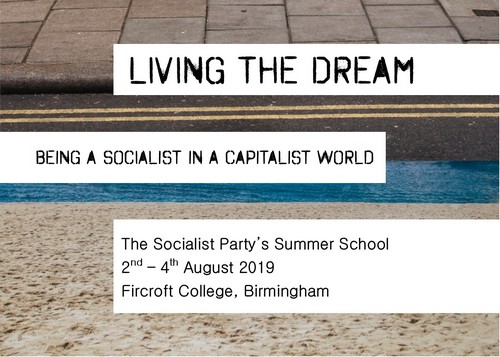
Living The Dream: Being A Socialist In A Capitalist World
Our political views are shaped by the circumstances we find ourselves in and how we relate to our situation. How does a socialist understanding of capitalism and the aim for a free and equal world compare with other political stances and belief systems? Why should we have a socialist outlook? And how does it impact on our lives? Our weekend of talks and discussion looks at what it means to have a socialist viewpoint in the 21st century.
Be Realistic: Demand The Inevitable (37 mins)
This talk will look at the notions of the impossible and the inevitable in a range of belief systems, including (but not limited to) socialism and other political belief systems. Why are people attracted to ideas that seem to be either impossible or inevitable? Or put off by them? What does it mean to campaign for something that might be impossible, or inevitable? What happens when assessments of impossibility or inevitability change? How do people believe that an impossible thing is true anyway? Or that an inevitable thing may never happen?
Besides socialism, the talk will hopefully address impossibility and inevitability in contexts such as liberalism, capitalism, flat earth, the end of the world, extraterrestrial life, Scottish independence etc.
Speaker: Edmund Griffiths (Oxford Communist Corresponding Society)
Date: Friday 2nd August 2019
Pt 2 (69 mins)
Living In Capitalism As A Socialist (38 mins)
Profit is the backbone of capitalism and profit is made from a plethora of resources, the greatest and most easily attainable of which is the global human resource, to be found in any village, town or city anywhere on the planet. The capitalist system is well known for waste as a necessary part of maximising profit and there is no greater waste than that of the human potential trapped in non-productive, non-useful work.
This session will take a look at the human misery attached to jobs, to work that many don’t really want to do but have to do to survive and will also look at the opposite position when human potential can be fulfilled to the satisfaction, and pleasure even, of billions of individual human beings.
“A map of the world that does not include Utopia is not worth even glancing at” – Oscar Wilde
Speaker: Janet Surman
Date: 3rd August 2019
Pt 2 (77 mins)
Team Human: Can You Live A Socialist Life In Capitalism? (36 mins)
Someone recently wrote a book called Team Human which emphasised that humans are social creatures who are most happy and fulfilled when working together for common goals. But how do we stay human in the vast antihuman infrastructure that is capitalism which constantly undermines our capacity to work together and connect with one another?
Despite the powerful forces that set us against one another (employment, nationalism, monetary gain), people are at their happiest when associating together in, for example, clubs, societies, family groups and social and political activities, which involve working with and helping other human beings. Socialists do this too. They belong to local clubs, community groups and trade unions. But how do they – or should they – react to being asked to go further and be associated with campaigns which involve, say, lobbying governments to improve conditions in particular areas, signing petitions calling on political parties to support certain changes in the law, or being members of or giving money to charities which seek to remedy deficiencies in social provision (e.g. housing, health care) or to save people from the consequences of sudden disasters, natural or man-made?
The socialist view is that time spent in attempts to reform capitalism is time wasted. But on a human, day-to-day level, Socialists often find it difficult just to stand by and do nothing. So how do we cope with the constant dilemmas thrown up by wanting to spend our time helping to create a truly associative social system, yet constantly being called upon to help patch up the contrary arrangements fundamental to capitalism?
Speaker: Howard Moss
Date: 3rd August 2019
Pt 2 (53 mins)
Ye Olde Worlde Revolution (47 mins)
Speaker: Bill Martin
Date: 4th August 2019
Pt 2 (68 mins)
SUMMER SCHOOL 2018
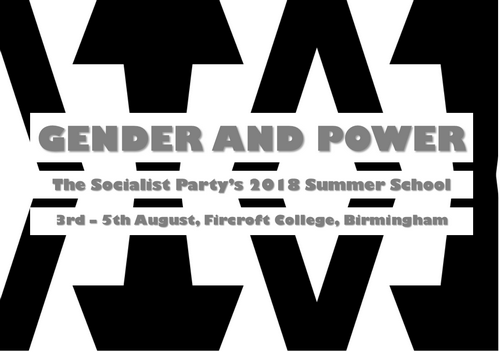
Gender and Power
Capitalism is a society of inequalities, in how both wealth and power are distributed. These inequalities have often affected women more adversely than men, and campaigns for women’s rights have been ongoing for over a century. But the debate around gender equality is no longer just about differences in wages or opportunities. Allegations of sexual harassment and abuse in Parliament and the entertainment industry especially have highlighted how some men have exercised their power. Also, the debate has broadened due to increased awareness of issues affecting transgender people, many of whom have felt marginalised.
How should socialists respond to the new prominence given to gender politics? What does gender inequality tell us about capitalist society, especially how it shapes gender roles? And how does the issue impact upon revolutionary politics? The Socialist Party argues that sexism and misogyny are expressions of how capitalism is inherently divisive and unequal. So, the solution is to address these problems at their source, by uniting to replace capitalism with a society based on equality and freedom.
Our weekend of talks and discussion will examine how gender issues relate to wider society and to revolutionary politics.
‘Equal Work for Equal Value’ (51 mins)
This talk will look at the relevance of value, and the labour theory of value to discussions around the gender pay gap in the workplace. It will look at value as a story told to lay claim to the output of society, and will relate that to Utopian visions of women and womanhood. It will argue that that value is not a value-free idea, but in fact a deliberate move in the class struggle to enforce the power of the capitalist class. Along the way, this talk will take in how the working class is exploited, and how this exploitation contains within itself the end of capitalist values. Finally, it will suggest that the struggle over equal wages contains within itself the drive toward the abolition of the wages system itself.
Speaker: Bill Martin
Saturday 4th August 2018
Pt 2 (35 mins)
Dangerous Women: How History and the Establishment Hide Female Militancy’ (49 mins)
From the militant 18th century female trade unionists who dunked strike-breakers under water pumps, to the matchwomen, suffragettes and the true founder the Me-Too movement, many of history’s most inspiring women have been designated the ‘wrong kind of heroines’ and their stories suppressed or minimised.
Guest speaker Dr Louise Raw has spent 20 years uncovering them, and will introduce or enlarge upon the histories of women of colour, of the working-class and with disabilities, who have much to teach us even today.
Guest Speaker: Dr Louise Raw
Saturday 4th August 2018
Pt 2 (15 mins)
‘Sex and Power’ (43 mins)
The sex industry makes up a significant, if partly-hidden, sector of the economy. Prostitution and pornography represent extremes of exploitation, lucrative to those with the power and damaging to those pushed into selling themselves. This talk will examine the differing impacts which the sex industry has on both women and men, and what this tells us about capitalism as a whole.
Speaker: Mike Foster
Sunday 5th August 2018
Pt 2 (64 mins)
SUMMER SCHOOL 2017
 These days, concerns about the environment tend to get pushed into the background by issues like Brexit, Trump’s presidency and ongoing austerity measures. But climate change, pollution and extinctions don’t go away just because the headlines are filled with other events. 2016 was the warmest year on record, with implications for sea levels and habitats; more and more waste is produced for future generations to deal with, and many hundreds of species continue to become extinct every year.
These days, concerns about the environment tend to get pushed into the background by issues like Brexit, Trump’s presidency and ongoing austerity measures. But climate change, pollution and extinctions don’t go away just because the headlines are filled with other events. 2016 was the warmest year on record, with implications for sea levels and habitats; more and more waste is produced for future generations to deal with, and many hundreds of species continue to become extinct every year.
Legislation places some restrictions on the use of dangerous materials, hunting and waste disposal, for example. However, legislators can only work within a system which is structured to safeguard the interests of the wealthy elite, rather than everyone. And of course laws don’t always prevent environmentally-damaging methods from being used if they save or make money. Capitalism turns the natural world into a resource to be exploited for a profit.
The Socialist Party argues that the environment can only be managed responsibly if society as a whole is managed co-operatively and in everyone’s interests. If our industries and services were owned and run in common, then we would be able to produce what we need and want in the most reasonable, sustainable way.
Our weekend of talks and discussions looks at the current state of the environment, and its prospects for the future we make for it.
1. DESTROYING THE HAND THAT FEEDS US (55 mins)
As scientists continue to warn us of species decline, climate change, pollution and environmental collapse, what is it that makes most people continue to believe that capitalism has the answers?
Glenn will look into these issues and present the case for a new society in which the threats to our environment can be addressed and how society can work alongside nature without being instrumental in its downfall.
Speaker: Glenn Morris
21st July 2017
Pt 2 (32 mins)
2. WORLD MILITARY VERSUS THE GLOBAL ENVIRONMENT (43 mins)
As citizens of the world contend with almost perpetual war there are various schools of thought about the real motives of those who promote, start or continue war somewhere on the planet. The military is just one arm of the global capitalist industrial complex, and vital to the hegemonic aims of powerful individuals and groups determined to funnel the profits into their own coffers.
It is also one of the most profitable arms of capitalism, one which reaps increasing profits on each successive annual assessment. Not taken into consideration, however, is the havoc wreaked on both people and environments worldwide.
The aim of this session is to investigate the increasing negative impacts of militarism on the global environment and identify the basic cause.
Speaker: Janet Surman
22nd July 2017
Pt 2 (41 mins)
Pt 3 (38 mins)
3. THE VEGANS ARE COMING! (50 mins)
The currently accepted socialist view of vegetarianism is that it’s a ‘lifestyle choice’. What this means is that, while a future socialist society may choose to be vegetarian or vegan as it pleases, the question has no immediate relevance to the class struggle we need to win right now, and therefore it’s not for us to tell workers what to do.
Yet this view is arguably being overtaken by events in wider society, which is having to face the realities of climate change including the huge and unsustainable impact of meat production. The anti-meat propaganda movement is gaining muscle in the wake of the 2009 Stern report, the 2010 UN call for a global move towards veganism, and just recently Simon Amstell’s controversial BBC mockumentary Carnage (see May 2017 Socialist Standard TV review). Perhaps it’s no longer a question of socialists telling workers what to do, but of workers telling socialists what to do. How should we react to this? After all, if meat production is unsustainable in capitalism it is likely to be just as unsustainable in socialism. Does it make sense, in that case, for us to remain aloof from the debate?
This session explores the various arguments with a view to clarifying what our position as socialists ought to be.
Speaker: Paddy Shannon
22nd July 2017
Pt 2 (67 mins)
4. SOCIALISM SAVES THE WORLD! (57 mins)
Revolution is long overdue of course – but the threats climate change presents to the habitability of the planet for humans in the long-term keep growing. Capitalism’s apparent continued inability to face up to this existential challenge makes this an issue of increasingly critical importance.
As a future socialist revolution unfolds, what sort of planet would an international, politically-aware working class be likely to be taking over?
Capitalist states and corporate sectors are currently outlining various future scenarios, and the market is busy laying bets on which technology might save the day. Shouldn’t socialists also look to this uncertain future? Would a global socialist society have to contend with a growing and hungry population? Would there be an urgent need for rapid industrial and agricultural development? And how would this impact on an already dangerously overheating planet?
Brian opens this session by looking at why we shouldn’t shy away from asking these often tricky questions. The talk will discuss some of the ways in which economic decisions might be made in the absence of the market, and then asks whether a system based on production for use will really be able to meet the fundamental challenge of a warming planet, in time?
Speaker: Brian Gardner
23rd July 2017
Pt 2 (37 mins)
SUMMER SCHOOL 2016
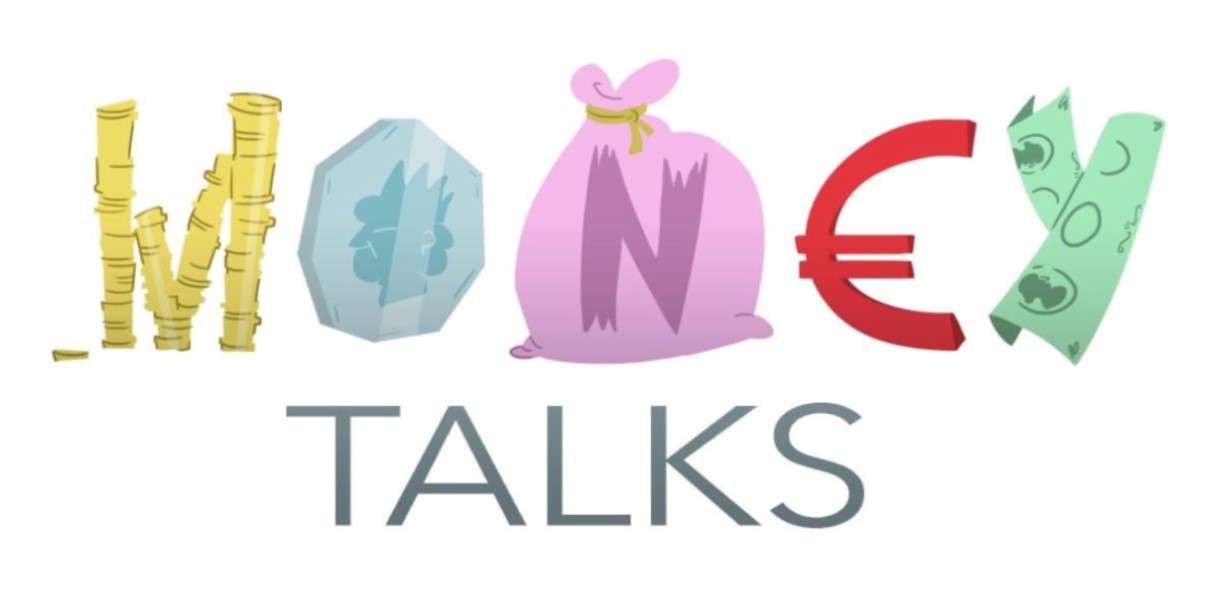 Money flows through every aspect of society, and therefore affects every aspect of our lives. What possessions we have, the efficiency of the services we use, and how we are supposed to value ourselves are all shaped by the money system. We’re encouraged to think of the economy in much the same way as we think about the weather – something changeable, but always there. When the climate is ‘good’, life feels brighter. When the climate is ‘bad’, we huddle down until we can ride out the storm. Although we’ll always have the weather, the economy doesn’t have to be permanent. Our weekend of talks and discussion looks at the role of money in our society. In what ways does money affect how we think and behave? How does the economy really function? How did money come to be such a dominant force? We also look forward to a moneyless socialist society, which will be – in more than one sense of the word – free.
Money flows through every aspect of society, and therefore affects every aspect of our lives. What possessions we have, the efficiency of the services we use, and how we are supposed to value ourselves are all shaped by the money system. We’re encouraged to think of the economy in much the same way as we think about the weather – something changeable, but always there. When the climate is ‘good’, life feels brighter. When the climate is ‘bad’, we huddle down until we can ride out the storm. Although we’ll always have the weather, the economy doesn’t have to be permanent. Our weekend of talks and discussion looks at the role of money in our society. In what ways does money affect how we think and behave? How does the economy really function? How did money come to be such a dominant force? We also look forward to a moneyless socialist society, which will be – in more than one sense of the word – free.
‘Profiting From A Moneyless World’ (40 mins)
Speaker: Janet Surman
Pt 2 (37 mins)
Pt 3 (34 mins)
‘An Idiot’s Guide to Banking – How To Avoid Being A Currency Crank’ (35 mins)
Speaker: Adam Buick
Pt 2 (27 mins)
‘Labour-Time Vouchers and Socialism’ (29 mins)
Speaker: Colin Skelly
Pt 2 (47 mins)
SUMMER SCHOOL 2015
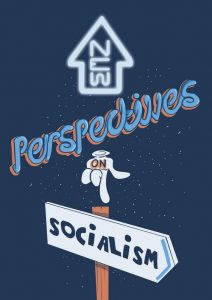
New Perspectives On Socialism
The principles of revolutionary socialism were formed over a hundred years ago. Then, capitalist growth was being fuelled by the technological and logistical developments following the Industrial Revolution. Since then, the history of capitalism has been marked by economic peaks and troughs, two World Wars, the rise and fall of state capitalism, massive advances in science, and widespread shifts in culture and beliefs. The Socialist Party of Great Britain argues that its original principles are still valid despite all these changes. This is because the basic structure of capitalism persists, regardless of differences in the way it is organised.
But is this right? Has society changed so much that class structure and the role of the state are significantly different now compared to the 19th and 20th centuries? What effects have these changes had on class consciousness and the likelihood of revolution? And how should revolutionary socialists respond through their theory and activity?
It’s always healthy to re-examine our beliefs, to see if they still apply to our ever-changing world. This weekend of talks and discussion will be an opportunity to take a fresh look at several important aspects of the socialist viewpoint.
REVOLUTIONARY ACTION (33 mins)
Speaker: Johnny Mercer
Pt 2 (36 mins)
Pt 3 (33 mins)
AS A MARXIST FRANKLY I’M SKEPTICAL (28 mins)
Speaker: Simon Wigley
24th July 2015
Pt 2 (52 mins)
THE X FACTOR – REVOLUTIONARY POLITICAL CONSCIOUSNESS (47 mins)
Speaker: Brian Gardner
25th July 2015
Pt 2 (36 mins)
IMAGINE A BOOT STAMPING ON A HUMAN FACE, OR GIVIN’ IT STR8 ON DA ST8: SOCIALISM AND THE STATE IN THE 21ST CENTURY (32 mins)
Speaker: Steve Clayton
26th July 2015
Pt 2 (35 mins)
Pt 2 (47 mins)
SUMMER SCHOOL 2014
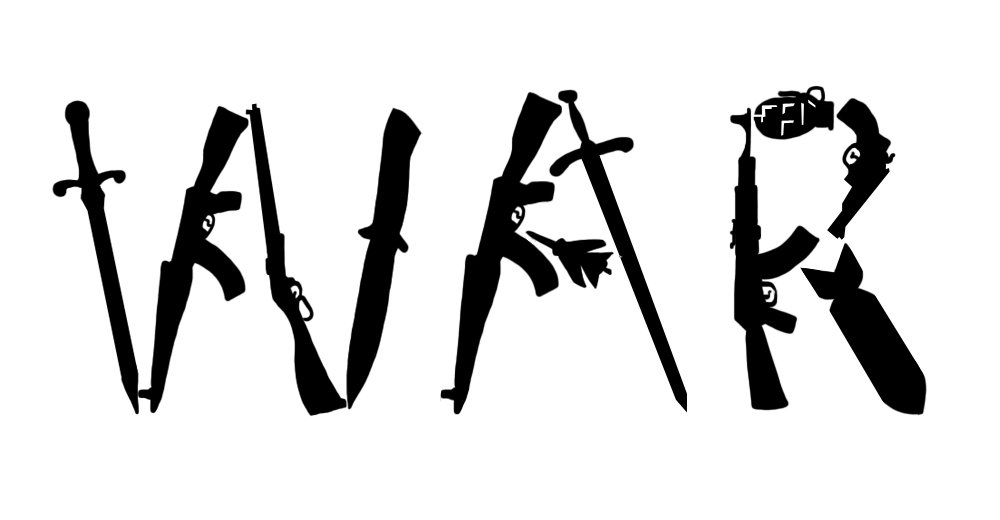
Capitalism causes war. In the last hundred years there has been a proliferation of war: two world wars, countless other conflicts and civil wars, the Cold War with its threat of nuclear Armageddon, and today the ‘War on Terror’. Socialists do not support capitalist wars, which veil the class struggle by developing a false sense of identity between the working class and the capitalist class. The interests of the two classes are always antagonistic, and that is why as socialists we speak of the class war. Socialism means, among other things, internationalism, rather than nationalism which always contributes to war.
Our weekend of talks, workshops and discussion will examine the role of war in capitalism and how only socialism can abolish war from the Earth.
MARX’S ATTITUDE TO WAR: WAS HE RIGHT OR WRONG? (29 mins)
Date: 20th June 2014
Speaker: Adam Buick
Pt 2 (36 mins)
IN WHOSE INTERESTS? THE OUTBREAK OF THE FIRST WORLD WAR (26 mins)
Date: 21st June 2014
Speaker: Gwynn Thomas
Pt 2 (70 mins)
THE WORKING CLASS WAS IN THE SADDLE: SOCIAL REVOLUTION IN THE SPANISH CIVIL WAR (50 mins)
Date: 21st June 2014
Speaker: Steve Clayton
Pt 2 (35 mins)
CLASS WAR, GENDER WARS AND WAR OF ALL AGAINST ALL (44 mins)
Date: 21st June 2014
Speaker: Richard Field
Pt 2 (56 mins)
HERE COME THE WAR ROBOTS: TECHNOLOGY AND WARFARE IN CAPITALISM (50 mins)
Date: 21st June 2014
Speaker: Bill Martin
Pt 2 (19 mins)
LIFE IN THE COLD WAR (38 mins)
Date: 22nd June 2014
Speaker: Mike Foster
Pt 2 (29 mins)
SUMMER SCHOOL 2013

Relationships
Our lives are shaped by our relationships with other people – from our closest loved ones to acquaintances we barely know. Often, our relationships depend on our personalities and interests. But there are wider social factors which influence who we know and how we get on with them. The structure of family life has changed over time, with relationships affected by economic pressures. At work, our relationships are defined by job roles and office politics. Also, technology now plays a greater part than before, especially with the spread of social networking sites. And across society, how we relate to others is still dictated by status and damaged by prejudice. Our weekend of talks, discussion and workshops will examine capitalist society’s influence on how we all fit together. We will also consider how socialism can make relationships more equal and fair.
FAMILY IN CLASS SOCIETY: FROM ENGELS TO ANTI-OEDIPUS (45 mins)
Date: Friday 12th July
Speaker: Steve Clayton
Pt 2 (44 mins)
ALIENATION AT WORK (32 mins)
Date: 13th July 2013
Speaker: Mike Foster
Pt 2 (36 mins)
Pt 3 (34 mins)
THE SPGB OBJECT AND PRINCIPLES (23 mins)
Date: 13th July 2013
Speaker: Jacqueline Shodeke
Pt 2 (32 mins)
PHYSIOGNOMY: THE PSEUDOSCIENCE THAT WON’T GO AWAY (43 mins)
Date: 14th July 2013
Speaker: Mike Foster
Pt 2 (36 mins)
SUMMER SCHOOL 2012

Protest
 Worldwide, people have reacted to the political and economic crisis with new forms of protest. From the Arab Spring uprisings to the Occupy Movement, activists are rejecting traditional forms of political assembly, and are looking for new ways of organisation.
Worldwide, people have reacted to the political and economic crisis with new forms of protest. From the Arab Spring uprisings to the Occupy Movement, activists are rejecting traditional forms of political assembly, and are looking for new ways of organisation.
But what will be the consequences of these new battles in the class war? Will these protests result in any lasting, positive change for the working class? Could they point towards a revolution? Or will they go the way of all reformism and just prolong the capitalist system which traps us all?
The Socialist Party’s weekend of talks and discussion will examine protests in all its forms – its aims, methods and effects.
THE ARAB SPRING (50 mins)
Venue: Harborne Hall, Birmingham
Date: 6th July 2012
Speaker: Janet Surman
Pt 2 (51 mins)

THE OCCUPY MOVEMENT: A DISCUSSION (33 mins)
A discussion between Ian Barker (Occupy Norwich) and Stair (SPGB)
Venue: Harborne Hall, Birmingham
Date: 7th July 2012
Pt 2 (29 mins)
Pt 3 (35 mins)
Pt 4 (38 mins)
POLICING THE CRISIS (36 mins)
Venue: Harborne Hall, Birmingham
Date: 7th July 2012
Speaker: Mike Foster
Pt 2 (34 mins)
Pt 3 (33 mins)
WHAT DID THE ROMANS DO FOR US? – Shakespeare, protest and mouldy cheese (37 mins)
Venue: Harborne Hall, Birmingham
Date: 7th July 2012
Speaker: Bill Martin
Pt 2 (23 mins)
LAND, SEA AND AIR: WORTH PROTESTING ABOUT (49 mins)
Venue: Harborne Hall, Birmingham
Date: 8th July 2012
Speaker: Glenn Morris
Pt 2 (33 mins)
Pt 3 (31 mins)
SUMMER SCHOOL 2000

William Morris
Venue: Fircroft College, Birmingham
Dates: 14th-16th July 2000
Transferred from tape cassettes. Some of the discussion sections are of very poor quality. The worst parts have been deleted and replaced with 2 seconds of silence.
An Evening With William Morris –
Edwin Walters
14th July 2000
Pt 2
The Utopian Tradition
Steve Coleman
15th July 2000
Pt 2
Pt 3
Morris and the Romantic Movement
Ron Cook
15th July 2000
Pt 2
The Stateless Society
Richard Headicar
15th July 2000
A Dream of John Ball
Adam Buick
16th July 2000
Pt 2
From Nowhere to Somewhere
Paddy Shannon and Stan Parker
16th July 2000
Pt 2
SUMMER SCHOOL 1999

Democracy
IS DEMOCRACY WORTH SAVING? (48 mins)
Date: 9th July 1999
Speaker: Richard Headicar
Pt 2 (43 mins)
Poor sound quality in pt.2
THE GREAT DEMOCRACY PICTURE SHOW (37 mins)
Date: 10th July 1999
Speaker: Steve Coleman
Pt 2 (50 mins)
THE PRESENT CONDITION OF DEMOCRACY IN THE WORLD (41 mins)
Date: 10th July 1999
Speaker: Vic Vanni
Pt 2 (49 mins)
Poor sound quality in pt.2
LITERATURE AND THE STRUGGLE FOR DEMOCRACY (51 mins)
Date: 10th July 1999
Speaker: Christopher Hampton
Pt 2 (39 mins)
Some inaudible comments in pt.2 have been removed
DEMOCRACY AND THE INTERNET (41 mins)
Date: 11th July 1999
Speaker: Paddy Shannon
Pt 2 (45 mins)
DEMOCRACY IN SOCIALISM (43 mins)
Date: 11th July 1999
Speaker: Pieter Lawrence
Pt 2 (44 mins)
SUMMER SCHOOL 1998
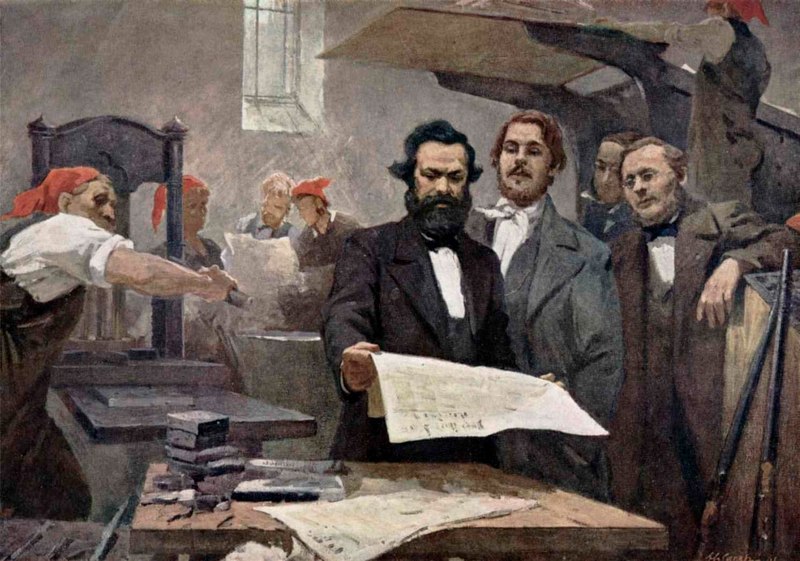
Marxism Revisited
WHO THE HELL WAS KARL MARX? (45 mins)
Date: 3rd July 1998
Speaker: Steve Coleman
HAS THE MARKET SUPERSEDED MARXIAN ECONOMICS? (47 mins)
Date: 4th July 1998
Speaker: Ron Cook
THE FETISHISM OF COMMODITIES (36 mins)
Date: 4th July 1998
Speaker: Dick Donnelly
DID LENIN REALLY DISTORT MARX? (34 mins)
Date: 4th July 1998
Speaker: Adam Buick
IS THE SOCIALIST PARTY MARXIST? (41 mins)
Date: 5th July 1998
Speaker: Steve Coleman
